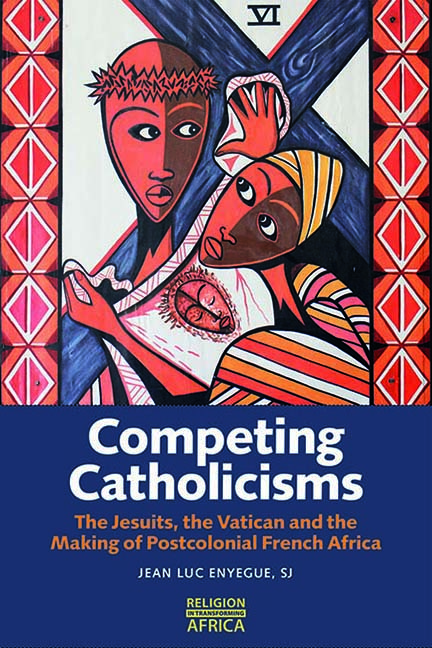Book contents
- Frontmatter
- Dedication
- Contents
- List of Illustrations
- Acknowledgements
- List of Abbreviations
- Glossary
- Chronology of Jesuit Missions in Chad and Cameroon
- Introduction: The End of the Jesuit Mission in Africa?
- Part I The Jesuit Project in West Africa: French Catholicism and Colonialism in Chad, 1935–58
- Part II The Outward Mission: Education and Competing Catholicisms
- Part III The Postcolonial Mission and Catholicity: From Chad to Cameroon, 1962–78
- Conclusion
- Bibliography
- Index
- Previously published titles in the series
Introduction: The End of the Jesuit Mission in Africa?
Published online by Cambridge University Press: 16 July 2022
- Frontmatter
- Dedication
- Contents
- List of Illustrations
- Acknowledgements
- List of Abbreviations
- Glossary
- Chronology of Jesuit Missions in Chad and Cameroon
- Introduction: The End of the Jesuit Mission in Africa?
- Part I The Jesuit Project in West Africa: French Catholicism and Colonialism in Chad, 1935–58
- Part II The Outward Mission: Education and Competing Catholicisms
- Part III The Postcolonial Mission and Catholicity: From Chad to Cameroon, 1962–78
- Conclusion
- Bibliography
- Index
- Previously published titles in the series
Summary
Éric de Rosny was among the first European Jesuits to settle in Cameroon, in 1957, three years before Cameroon's independence or political Africanisation. Now, in 1970, he faced a crisis second only to that of the Second World War, which he had witnessed as a child. Could this be ‘mission terminée’, as de Rosny would later refer to it in his book L’Afrique des guérisons, the end of the French Jesuit mission in Africa, and the beginning of the transition from missionary Christianity to African Christianity?
‘Mission terminée’. For lovers of African literature such as Jesuit missionary Éric de Rosny, Mission terminée was the title of a popular novel by Cameroonian novelist Mongo Beti. For de Rosny, fiction had now turned into reality. An existential crisis was dividing his soul. One can imagine him seated at a window in the Jesuit community of Rue de Grenelle, 7th arrondissement, looking up at the Paris night sky, and searching for a star that might give him direction, inspiration, or a word from above. Meinrad-Pierre Hebga, his Cameroonian religious superior, had not responded to de Rosny's last letter requesting guidance on what he should do in the light of the pope's declaration to the African people that they should rule themselves religiously as much as politically. This silence from his superior was doing nothing to calm de Rosny's nerves. Perhaps he understood that Hebga wanted him to decide by himself the question he alone could answer before his God and his own conscience: whether or not to return to Cameroon as a missionary, and for what purpose, if the mission was over.
When De Rosny had arrived in Cameroon in 1957, the Jesuits of Lyon Province had just turned down the invitation to take over Libermann, one of Cameroon's most prestigious secondary schools in Douala. Lyon, in neighbouring Chad, where the Jesuits had been established since 1935, they told him, had greater and more urgent priority. The Jesuit mission in Chad was considered vitally ‘strategic’ for Roman Catholicism and stability in the entire region. It was also strategic for France as a nation. Lyon Province had no intention of diverting resources elsewhere, not even to Cameroon.
- Type
- Chapter
- Information
- Competing CatholicismsThe Jesuits, the Vatican and the Making of Postcolonial French Africa, pp. 1 - 22Publisher: Boydell & BrewerPrint publication year: 2022

